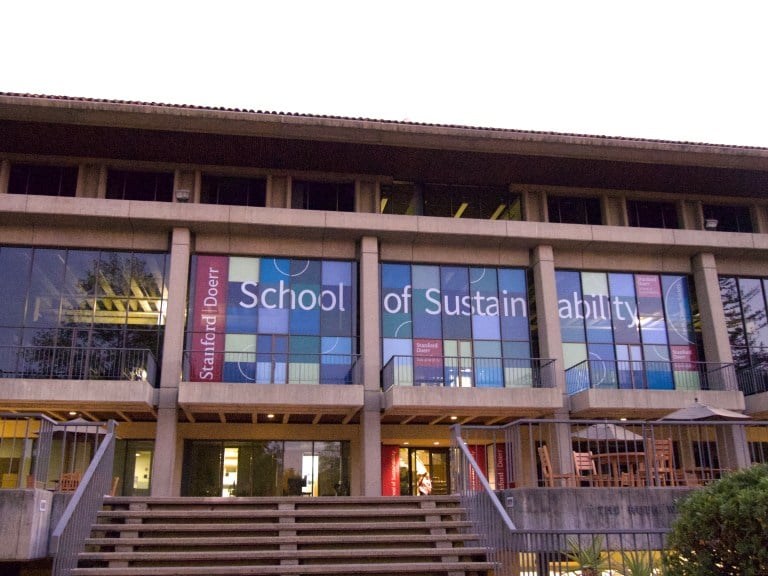The Doerr School of Sustainability opened its doors on Sept. 1, 2022, as the first new school founded at Stanford in 70 years.
One year and two months later, the school is in the process of rolling out a series of grant programs centered around focus areas for research and is positioning to hire 60 new faculty in the next decade. Simultaneously, the school has faced calls to cut ties with fossil fuel funding of research since it was announced and conducted a listening tour to gather community perspectives.
The Doerr School has spent the past year working to provide more opportunities and resources to students and faculty, according to Jenna Davis, an associate dean and professor at the Doerr School.
“We’re anticipating hiring several dozen new faculty over the next eight to 10 years in various areas of sustainability to help build out these departments,” Davis said. “In the Doerr School specifically, there are a couple of new grants programs that are designed to motivate faculty and students to come together in multidisciplinary teams to tackle big sustainability problems.”
One of those grant programs is the Sustainability Accelerator, which aims to “co-develop potentially scalable sustainability technology and policy solutions with external partners worldwide,” according to the Doerr School website. These grants are centered around several focus areas for research the school has called “Flagship Destinations.”
The Doerr School announced their first Flagship Destination — greenhouse gas removal — in April 2023. Zoe Colloredo-Mansfeld ’26 said that this focus area benefits fossil fuel companies because it extends the length of time they can continue to burn fossil fuels.
“Broadly, I support ideas of carbon capture and storage permanently,” Colloredo-Mansfeld said. “I also worry about whose interests are served in the current understanding and shaping of the Flagship Destination.”
According to Colloredo-Mansfeld, there’s also an opportunity cost to research. “What is the un-done science that does not occur when a professor realigns their work with the Doerr School priorities, and what are the forces shaping their decision?” she said.
The Doerr School of Sustainability did not respond to repeated requests for comment.
According to Davis, input from faculty has always been a cornerstone of the Doerr School. Davis said that Doerr School dean Arun Majumdar “really is very consultative and wants to see the tradition of getting faculty input continue even as we start to crystallize the details of some of these programs.”
Majumdar met student criticism of fossil fuel funding of the Doerr School with a listening tour last year. Then-university president Marc Tessier-Lavigne formed a committee to review fossil fuel funding in December 2022 based on the perspectives gleaned from the listening tour. Divestment, or total financial disentanglement with fossil fuel companies, is not on the table, according to previous reporting by The Daily.
Students and other community members criticized the Doerr School throughout its inaugural year. The opening ceremony for the school last year was interrupted by a protest organized by the Stanford Coalition for a True School of Sustainability, and in May 2022, hundreds of students, faculty members and alumni called for the Doerr School to reject fossil fuel funding in an open letter.
“So often, I feel like there’s this alienation between admin and students that just seems to be growing,” said Amanda Campos ‘26, member of the Coalition for a True School of Sustainability. “We’re not being naive. It’s just we are looking at what’s going on, and we’re demanding a better school.”
According to Colloredo-Mansfeld, who is also a member of the Stanford Coalition for a True School of Sustainability, fossil fuel funding of climate research is concerning in part because of a history of misinformation campaigns.
“They have taken actions that actively endanger the lives of every being on this planet, and then to turn around and see those people as equal partners in the fight to undo that damage — to me, seems naive at best, and a betrayal at worst,” Colloredo-Mansfeld said.
According to a brief created by the Coalition for a True School of Sustainability, the fossil fuel industry, including ExxonMobil and the American Petroleum Institute, has understood the impact of its emissions since the 1970s but chosen to continue to oppose climate change legislation.
“The company’s public statements directly contradicted its own climate science data,” the brief reads.
The brief points to independent research as supporting concerns that fossil fuel funding influences research. According to a paper published in Nature in November 2022, the source of research funding influences the favorability of the research to the funder. However, the paper notes there are some limitations to the research.
“Our incomplete funding data do not allow us to reject the possibility of reverse causality,” the paper reads. Reverse causality “occurs when the outcome precedes and results in the exposure,” according to the NIH.
Students from the Coalition for a True School of Sustainability said their criticisms are rooted in hope. “I’m actively working to make the Doerr School truly achieve its potential because I love the school so much, because I’m so dedicated to the school, because I’m so amazed by everyone around me and the amazing resources it has at its disposal,” Campos said.
